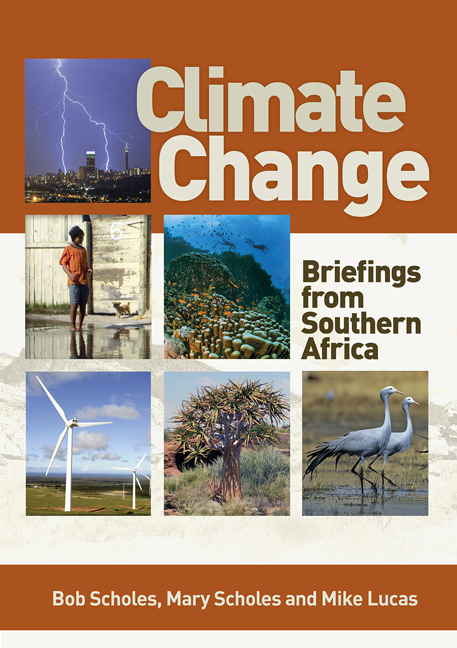Book contents
- Frontmatter
- Acknowledgements
- Contents
- Foreword
- Acronyms and abbreviations
- Preface
- How do governments assess climate change?
- Section 1 Earth system science: The processes that underlie climate change
- Section 2 Consequences of a changing climate for the Southern African environment
- Section 3 Consequences of a changing climate for society
- Section 4 What we can do to avoid and adapt to climate change
- Codicil Is there a dangerous level of climate change?
- Glossary
- List of figures
- References
- Reading list
- Index
Foreword
Published online by Cambridge University Press: 20 April 2018
- Frontmatter
- Acknowledgements
- Contents
- Foreword
- Acronyms and abbreviations
- Preface
- How do governments assess climate change?
- Section 1 Earth system science: The processes that underlie climate change
- Section 2 Consequences of a changing climate for the Southern African environment
- Section 3 Consequences of a changing climate for society
- Section 4 What we can do to avoid and adapt to climate change
- Codicil Is there a dangerous level of climate change?
- Glossary
- List of figures
- References
- Reading list
- Index
Summary
The recent natural disasters experienced globally, which may have been the result of climate change, serve to emphasize the need for all states and citizens to stand in solidarity in addressing and mitigating the unpredictable effects of climate change and global warming. The effects will be felt not only by individuals but also by industry, and this will have a particularly severe impact on the global south. This is a stark reminder of the need for a more balanced and equitable global society that is free from hunger and poverty.
A rational response to this threat will require partnerships between nations as well as increased support for research and innovation. These will be needed to save future generations’ livelihoods and prosperity, and also to preserve the welfare and well-being of the global population.
This book summarizes the important knowledge gathered around global change and its impact in the Southern African region. It points out that the Southern African region has over the past century warmed at a rate of about twice the global average. What is more perturbing is that it will continue to do so if proactive actions are not taken to address global warming. The fact that large parts of Southern Africa are already hot and dry makes the countries in this region all the more vulnerable to further warming and greater rainfall uncertainties.
The South African Department of Science and Technology has for many years supported research into climate change, its impact and strategies for adaptation and prevention. The Department will continue to provide strategic direction and support in understanding climate change and in related research and innovation. South African researchers, including the authors of this book, continue to make significant contributions to the global knowledge base on this crucial twenty-first century issue.
It is clear that global warming and climate change affect everyone. I believe that, as citizens, we must play a role in developing solutions which meet our aspirations for a better life and ensuring that we do not condemn future generations to an intolerable environment.
It is therefore with great satisfaction that I introduce this sometimes complex science of Earth's climate to the people for whom it is most relevant – the ordinary, interested parties outside of the scientific community.
- Type
- Chapter
- Information
- Climate ChangeBriefings from Southern Africa, pp. ixPublisher: Wits University PressPrint publication year: 2015

